|
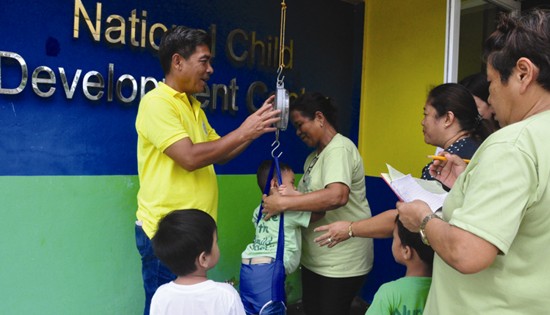
Data
gathered during Operation Timbang Plus (OPT+) like weight
and height measurements of children are among the parameters
in determining the Nutrition Status of a locality. Photo
shows the weighing of children in Bobon, Northern Samar. |
Eastern Visayas
nutrition situation reported
By
JACK C. GADAINGAN
September 18, 2019
TACLOBAN CITY –
Based on 2018 Operation Timbang Plus of pre-school children aged
0-59 months Samar province ranks first in the provincial ranking on
underweight and severely underweight with a prevalence of 13.7%,
followed by Northern Samar province in second with a prevalence of
9.5%, and by Eastern Samar province in third with a prevalence of
8.4%. In fourth is Leyte province with 8.3%, fifth Biliran province
with 7.5%, and Southern Leyte province in sixth with 5.9%.
Among the cities in Region
8, Baybay City ranks first with a prevalence of 11.9%, Calbayog City
in second with a prevalence of 10.3%, and Borongan City in third
with a prevalence of 9.3%. This is followed by Ormoc City in fourth
with 7.3%, Catbalogan City in fifth with 6.9%, Maasin City in sixth
with 3.5%, and Tacloban City in seventh with 3.4%. A child is
underweight when his/her weight is lower or below the normal weight
for his/her age.
Dr. Catalino P. Dotollo
Jr., National Nutrition Council Region VIII (NNC-8) Regional
Nutrition Program coordinator, detailed this in a presentation of
Local Nutrition Situation during the conduct of “Asin Summit” at the
Department of Education (DepEd) Leyte Division Gymnasium in Palo,
Leyte on July 26, 2019.
In terms of stunting Samar
again ranks first in provincial ranking with a prevalence of 29.1%,
followed by Leyte in second with a prevalence of 18.7%, and Northern
Samar in third with a prevalence of 18.5%. Biliran province follows
in fourth with 18.5%, Eastern Samar in fifth with 17.1%, and
Southern Leyte in sixth with 14.1%.
Among the cities Baybay
City again ranks first in stunting with a prevalence of 24.5%,
likewise followed by Calbayog City in second with a prevalence of
21.4%, and Ormoc City in third with a prevalence of 19.2%. Borongan
City comes in fourth with 18.7%, Tacloban City in fifth with 17.7%,
Catbalogan City in sixth with 16.7%, and Maasin City in seventh with
7.4%. Stunting is a condition when a child’s height is lower or
below the normal height for his/her age.
On wasting or Weight for
Length/Height, Biliran province topped in first with a prevalence of
5.4% (1,122 magnitude), Northern Samar follows in second with a
prevalence of 5.4%, Leyte in third with prevalence of 5.1%. Samar
province in fourth with 4.9%, Eastern Samar in fifth with 4.2%, and
Southern Leyte in sixth with 4.0%.
Among the cities Baybay
City ranks first with a prevalence of 7.1%, Calbayog City second
with a prevalence of 6.4%, Ormoc City third with a prevalence of
5.3%. Borongan City fourth with 5.3%, Catbalongan City fifth with
5.2%, Tacloban City sixth with 4.9%, and Maasin City in seventh with
1.4%. Wasting is when a child’s body weight in proportion to his/her
length, height or thinness is low relative to the standard
weight-for-length/height.
In terms of overweight and
obesity, Northern Samar ranks first in provincial ranking with a
prevalence of 4.3%, Samar ranks second with a prevalence of 4.2%,
Eastern Samar in third with a prevalence of 4.1%. Leyte in fourth
with 3.9%, Southern Leyte in fifth with 3.9%, and Biliran in sixth
with 3.5%.
Among the cities, Baybay
City again ranks first with a prevalence of 6.3%, Catbalogan City in
second with a prevalence of 5.3%, Ormoc City in third with a
prevalence of 5.0%. Borongan City in fourth with 4.6%, Tacloban City
in fifth with 3.7%, Calbayog City in sixth with 3.1%, and Maasin
City in seventh with 1.8%. Overweight and obesity is when a child’s
body weight in proportion to length/height or fatness is high
relative to the standard weight for his/her
weight-for-length/height.
The OPT+ was conducted in
six provinces, seven cities and 134 of 136 municipalities of Eastern
Visayas region covering 61.3% of 0-59 months Preschool Children.
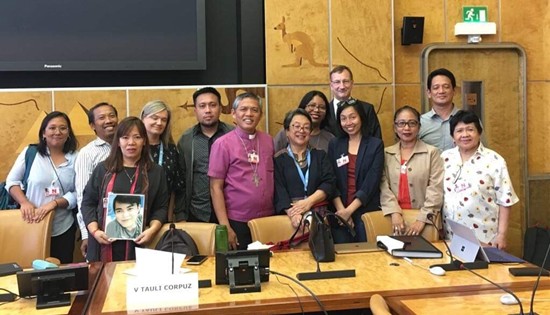
Ecuvoice
and the World Council of Churches of the Philippines with UN
Special Rapporteur Victoria Tauli-Corpuz. |
Ecuvoice calls on
the Philippine government to stop deflecting issues, cooperate with
UNHRC process
Press Release
September 18, 2019
QUEZON CITY – The
World Council of Churches (WCC) together with the Ecumenical Voice
for Peace and Human Rights in the Philippines (Ecuvoice) sponsored a
side event in Geneva, Switzerland on the Philippine human rights
situation, entitled “War vs. the Poor and Indigenous Peoples:
Duterte and Human Rights Council.”
Joining human rights
defenders, church leaders and victims of human rights abuses from
the Philippines were representatives from the missions at the UN
Human Rights Council, international NGOs and human rights
organizations from the Philippines.
The side event was held at
Palais Des Nations during the 42nd session of the UN Human Rights
Council (UNHRC). Peter Prove and Jennifer Philpot-Nissen of the
Commission of the Churches on International Affairs of the WCC
served as moderators for the event.
Large-scale murder
Among the panelists who
shared their real life stories was Marissa Lazaro, a mother whose
son was slain in 2017.
"There is a large-scale
murder of the poor,” said Marissa Lazaro.
“The police killed my son,
Christopher. He is not a drug user. He is innocent,” she added. Just
like the many other mothers who lost their loved ones from the
Duterte government’s murderous war on drugs, Marissa continues to be
strong amidst grief.
Lazaro is a member of Rise
Up for Life and Rights’ (Rise Up), a network of families of victims
of the government’s war on drugs. Her son, Christoper, was killed in
a police anti-drug operations in 2017 after authorities claimed he
refused arrest and fought back. She later found Christopher dead in
a morgue in Bulacan, with nine (9) fatal bullet wounds in his body.
“The war on drugs is a
sham,” Lazaro said. “We come to the United Nations Human Rights
Council seeking help in putting a stop to the large-scale murder of
poor people in the Philippines,” she added.
The UN HRC passed a
resolution in July 2019 on human rights violations in the
Philippines.
Attacks against indigenous people
“While urban poor
communities are experiencing bloodbath through anti-narcotics police
operations, our tribal communities endure long-term militarization,”
said Bishop Antonio Ablon, a Mindanaoan and a long-time advocate of
indigenous people’s rights.
“The Lumad people in
Mindanao have long been ravaged by the government’s
counter-insurgency war,” Ablon said. “The government brands them as
communist-terrorists and wages war against them to force them off
their ancestral land and hand it on to giant mining companies,” he
added.
Ablon, a Bishop of the
Iglesia Filipina Independiente, himself is a victim of red-tagging
and other threats on Mindanao.
Ablon called for support
for the Lumad people’s right to their ancestral land against
corporate plunder and militarization. “The violence Lumad people
suffer at the hands of military is wrong and immoral, we must take
it as our own collective responsibility to defend them and uphold
their rights,” he added.
Villification, killings of human rights defenders
Cristina Palabay,
Karapatan Secretary General and head of Ecuvoice delegation, said
that the government’s war on drugs and counter-insurgency operations
only resulted to the death of innocent civilians. “These are state
instruments of an all-out war against the poor,” Palabay said.
Palabay lamented how those
who defend human rights equally suffer vicious attacks. She noted
that at least 155 human rights defenders across the country have
been killed under the Duterte administration, including Karapatan
human rights workers.
Supporting Palabay’s claim
was Budi Tjahjono of the international NGO Franciscans
International. “There is an exponential increase in the number of
attacks against human rights defenders in the Philippines,” he
observed. Tjahjono was part of a WCC delegation to the Philippines
that met with human rights victims and defenders in August 2019.
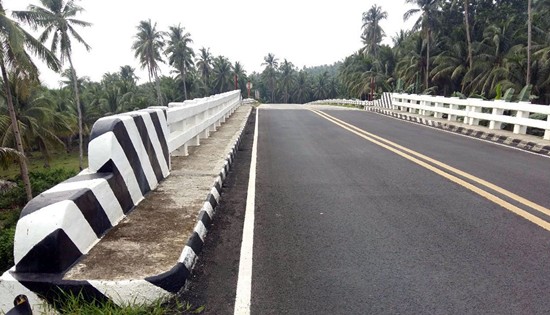
Completed
rehabilitation of Talibong Bridge in Cabucgayan town worth
P1.9M. |
DPWH-Biliran
DEO’s FY 2019 projects posts 28.78% accomplishment
By
DPWH-Biliran
September 18, 2019
NAVAL, Biliran –
The Department of Public Works and Highways (DPWH) Biliran District
Engineering Office (DEO) has achieved 28.78% of its 2019
infrastructure projects as of August 31, 2019.
The district office is
currently implementing 92 projects for this year with a total amount
of P1.28M [sic] funded under 2019 General Appropriations Act (GAA).
David P. Adongay Jr.,
District Engineer reported that six projects are already completed,
69 are already on-going and 19 are still not yet started due to
unfavourable weather conditions and some modification on the
project.
Recently completed
projects are the rehabilitation Talibong bridge in Cabucgayan town
and Mainit Bridge in Caibiran town with a budget cost of P1.9M and
P2.8M, respectively. These projects are implemented under 2019
Regular Infrastructure Program.
Meanwhile, four projects
under 2019 Local Infrastructure Program are also completed.
These projects are the
P7.18M construction of Flood Control in Sitio Lomboy, Brgy.
Calumpang in Naval town and P1.9M construction /concreting of Brgy
Road at Sitio Ansay, Brgy. Union, Caibiran, Biliran, P4.88M
rehabilitation and Expansion of Brgy. Road, Brgy. Busali to Brgy.
Pinangomhan and construction (completion) of Multi-Purpose Building
at Brgy. Cabibihan in Caibiran town worth P978,870.00.
“Despite the delay in the
approval of the budget, the district will deliberately and strictly
monitor the implementation to attain timely completion of the
projects, and of course within the standards.” said Adongay.
|
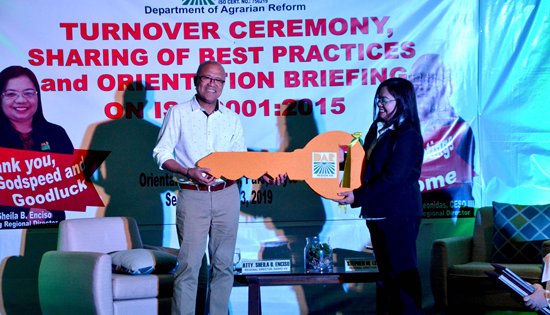
Regional
Director Stephen Leonidas (left) officially assumed his new
assignment as the incoming regional director of the
Department of Agrarian Reform (DAR) in Eastern Visayas after
accepting the symbolic key of responsibility from his
predecessor Atty. Sheila Enciso (right) during the turnover
ceremony on September 3, 2019 at the Oriental Hotel in Palo,
Leyte. Enciso was transferred to Western Visayas. (Jose Alsmith L. Soria) |
New DAR-8
regional director installed
By
JOSE ALSMITH L. SORIA
September 13, 2019
TACLOBAN CITY –
Regional Director Stephen M. Leonidas officially assumed office as
the new head of the Department of Agrarian Reform (DAR) in Eastern
Visayas following his installation on Tuesday, September 3 this
year.
RD Leonidas accepted his
new assignment when his predecessor, Atty. Sheila Enciso, formally
turned over to him the symbolic key of responsibility, as well as
the ISO 9001:2015 and the PRIME-HRM Level 2 manuals during the said
occasion at the Oriental Hotel.
On August 13, Agrarian
Reform Secretary John Castriciones issued Special Order No. 504
transferring Leonidas to Region VIII, while on the same document
Enciso was re-assigned to Region VI. Both regions are considered
high-LAD regions (regions with still high balances on Land
Acquisition and Distribution).
A resident of Bacolod
City, Leonidas, the 19th regional director to serve DAR in this
region since the agency was created in 1971, disclosed that this is
already his 16th transfer in 15 assignments as a third level
official.
He added that this also
completes his Visayan Region tour for he has already been assigned
to Regions VII and VI, his last assignment prior to his transfer to
Region VIII.
According to him, in order
to exist in a situation where he is not familiar, he always expect
for the worst-case scenario.
Leonidas said, he is not
new to Region-8. He shared that during the time of then Secretary
Virgilio de los Reyes, he was invited to work with the Provincial
Agrarian Reform Officers (PAROs) here on claim folder review.
After Typhoon Yolanda hit
this region, “RD Shee invited me also as one of the speakers to give
lectures to the MAROs (Municipal Agrarian Reform Officers) of this
region, which was conducted in Cebu”, he added.
An expert in solving
contentious landholding problems, Leonidas inherited more than
62,000-hectare balance for distribution to qualified farmer
beneficiaries in the provinces of Leyte, Western Samar, Northern
Samar, Eastern Samar and Southern Leyte under the Comprehensive
Agrarian Reform Program (CARP), which the President wants to be
completed by 2022 when his term ends.
For this year, DAR Eastern
Visayas is tasked to distribute 2,050 hectares of agricultural
lands.
P8.2B budget of
Office of the President to escalate killings, attacks vs. Filipinos
By
KARAPATAN
September 11, 2019
QUEZON CITY – Human
rights group Karapatan questioned and opposed the P8.2 billion
budget of the Office of the President (OP) for the year 2020, which
was swiftly approved in less than 7 minutes.
On Friday, September 6,
2018, at a hearing before the House of Representatives Committee on
Appropriations, even without a presentation detailing its specifics,
the Office of the President’s budget was approved because of
“traditional courtesy.”
“Our checks and balances
are failing. The parasites in Congress would rather pass such a
critical and enormous budget for “courtesy,” rather than asking the
right and necessary questions. The OP budget is classified as
discretionary funds, which make it vulnerable to corruption and
other irregular transactions. Knowing this government, such a huge
sum will fuel repression, disinformation, and all-out attacks
against the Filipino people. It will fund the guns and weaponry that
will aggravate the killings and attacks in communities,” said
Karapatan Secretary General Cristina Palabay.
“The spike in Duterte’s
budget, which is 21% higher than his office’s P6.77 billion budget
in 2019, should have prompted lawmakers to question it. The increase
alone is already alarming, made even more daunting by the
confidential and intelligence funds which are almost doubled. Our
coffers will yet again pay for the riding-in-tandem gunmen, the
bombs that will raze communities, the rewards for fake surrenders,
the blabbermouths that will twist the stories, and the whole
structure of impunity that will leave perpetrators off the hook,”
she added, citing reports that more than half of the Office of the
President’s budget for the year 2020 consists of confidential and
intelligence funds which amounts to P4.5 billion. With this approved
budget, Duterte’s office will receive the biggest share of
confidential and intelligence funds out of all agencies.
Palabay also raised that
this is the danger of having a Duterte-allied supermajority in
Congress. “Is “traditional courtesy” even an acceptable excuse?
Those in Congress are not thinking about their constituents, but are
deciding on the basis of what makes their President happy – no doubt
to boost their own political career. They are complicit to the
killings and violations, and they expose the rotten core of our
legislative system.”
The Karapatan official
expressed that the misallocation of funds have been an issue, time
and again. “Duterte is a populist, yet the budget reveals his talk
about universal healthcare, free education, and other populist
measures are mere rhetoric. In a latest report, the budget for the
Department of Education’s Government Assistance Subsidies has been
decreased by 2.93% – from P32.12 billion in 2019 to P31.18 billion
in 2020. Meanwhile, the Department of Health revealed that there
could not be a national roll-out of the Universal Health Care as it
would need about P257 billion, but will likely be given a P166.5
billion proposed budget. The Department of Science and Technology
will likewise be getting a mere P20 billion, a small sum in
comparison the PNP’s P185 billion in 2020,” Palabay explained.
“Social services are
constantly non-prioritized while the budget for the PNP and the
military are beefed up annually. Clearly, we can see what is valued
and what is intentionally left behind. This is where money goes when
you have militarists in government. The socio-economic ills of our
country are being ignored while people who raise legitimate demands
about poverty and injustice are shot and illegally arrested. The
government plans to dazzle Filipinos with infrastructures that have
resulted to an outstanding external debt of P7.49 trillion, from
last year’s P7.3 trillion and 2017’s P6.7 trillion. The situation
on the ground has gone from worse to worst as majority are bearing
the brunt of unemployment, lower wages, criminal neglect of the
agricultural sector, contractualization, and inaccessible social
services – piled on top of State terrorism in urban and rural
communities,” Palabay said.
“Truly, there is less and
less for the Filipino people in this regime. A life of security and
dignity is not afforded to Filipinos, unless one is a kumpadre of
those in Malacañang; they even give you an additional bonus and free
pass to be absolved of whatever crime you commit. We see an
exacerbation of the political and economic crisis, given the 2020
budget and the Duterte regime’s policy thrusts. As the deliberations
on the 2020 budget are expected to be completed before the 18th
Congress takes a break in October, we enjoin everyone to remain
vigilant. There is no transparency and accountability in this
government, and the people are once again called to task,” concluded
Palabay.
|
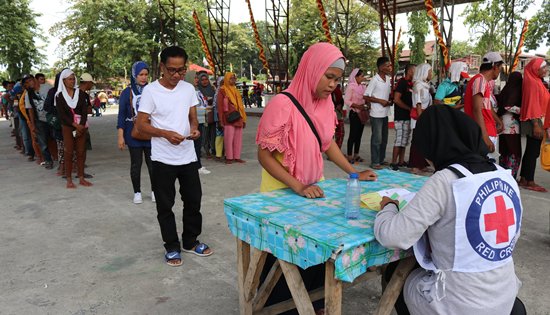
Thousands
of families in Maguindanao province in southern Philippines
have been facing repeated and prolonged displacement for six
months now due to the clashes between government forces and
armed groups. To support them, the ICRC with the Philippine
Red Cross provided two-week food rations to 1,280 displaced
families (approximately 6,400 people) on Sept. 4-5.
(ICRC/
Baipulo Sultan) |
Civilians bear
the brunt of recurrent fighting in Maguindanao
By
ICRC
September 6, 2019
MANILA – Thousands
of families in Maguindanao province in southern Philippines have
been facing repeated and prolonged displacement for six months now
due to the clashes between government forces and armed groups. They
are in need of support, as the return home to their villages remains
uncertain.
“It’s the second time that
thousands of families in Shariff Saydona Mustapha and Datu Salibo
towns have had to stay in cramped evacuation sites for over a month.
They are afraid to return home as the situation there remains
volatile,” said Roberto Petronio, interim head of the International
Committee of the Red Cross (ICRC) subdelegation in Cotabato.
The ICRC teams from
Cotabato assessed the condition of these affected communities over
the past few weeks, identifying the needs and listening to their
concerns.
Displaced and unsure about
the immediate future, these families have been unable to earn a
steady income as their access to farms remains restricted. Though
various government agencies promptly distributed food items among
those displaced, other basic needs have persisted.
“Living in a tent is very
difficult, especially when it rains. We have no choice but to endure
it. Both my children are in elementary school but they haven’t been
able to attend classes due to the clashes. I hope we can return home
soon without any fear and go back to leading a normal life,” said
Yahiya Alabay of barangay Ganta in Shariff Saydona Mustapha.
Yahiya’s family is among
the 1,280 households (approximately 6,400 people) in barangays
(villages) Ganta, Bakat, Inaladan and Dasawao in Shariff Saydona
Mustapha and Penditen in Datu Salibo who collected ICRC food rations
during the distribution held on Sept. 4 to 5.
With the support of the
Philippine Red Cross (PRC), the ICRC’s operational partner, each
family received two-week rations consisting of 25 kg of rice, 2
litres of cooking oil, 1 kg of sugar, ½ kg of salt, one litre of soy
sauce and 12 tins of sardine.
After the clashes first
broke out in March, the ICRC with the PRC provided food, household
and hygiene items to around 6,700 displaced people in Datu Saudi
Ampatuan, Datu Unsay, Shariff Aguak and Datu Salibo.
From April to July,
regular trucking of potable water was done for almost 5,500 people
living in evacuation sites. Rural health units in eight Maguindanao
towns and three hospitals were also supplied with medicines and
medical material to cater to over 11,000 people in April and in
August.
“We will continue to
monitor the situation and extend our help based on the needs.
Ultimately, we hope that these displaced families can safely return
home to a stable life,” Petronio said.
The ICRC is a neutral,
impartial and independent organization whose exclusively
humanitarian mission is to protect the lives and dignity of victims
of armed conflict and other situations of violence and to provide
them with assistance. It has an international mandate to promote
knowledge for and compliance with the international humanitarian
law.
As civilians continue to
bear the brunt of fighting, the ICRC reminds all parties to the
conflict of their obligation to protect civilians and civilian
properties, and those who are not or no longer participating in the
hostilities.
|
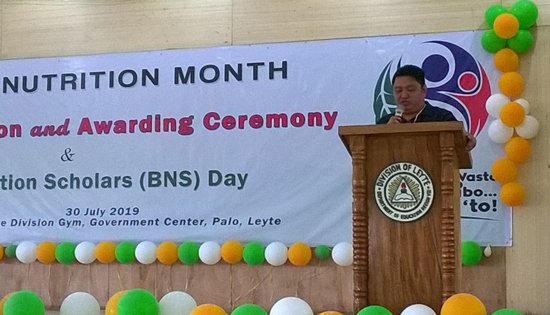
Dr.
Ronelio Al K. Firmo, Leyte Schools Division superintendent,
reveals DepEd health and nutrition interventions in “Oplan
Kalusugan” during the 45th Nutrition Month celebration
culmination on July 30, 2019. |
Schools Division
chief bares ‘Oplan Kalusugan’
By
JACK C. GADAINGAN
September 4, 2019
GOVERNMENT CONTER,
Palo, Leyte – The Department of Education (DepEd) has
consolidated all its health programs, plans, policies, and
activities for their effective and efficient implementation at the
school level into “Oplan Kalusugan.”
Included in this
convergence of interventions are five flagship programs namely: 1.
The major school health and nutrition program specifically the
School-Based Feeding Program (SBFP); 2. National Drug Education
Program (NDEP); 3. Adolescent Reproductive Health Education (ARH);
4. Water, Sanitation, and Hygiene (WASH) in Schools (WinS); and 4.
Medical, Dental, and Nursing Services; and 5. Mental Health Program.
Dr. Ronelo Al K. Firmo,
Leyte Schools Division superintendent, revealed this in his welcome
address during the 45th Nutrition Month Celebration Culmination and
Awarding Ceremonies held at the DepEd Leyte Division Gymnasium, here
on July 30, 2019.
According to Firmo, in
regards to school-based feeding program the agency funds public
schools for a 120 feeding-day period, and the Leyte Division has
already released funds for the first 120 days feeding program of
schools under its jurisdiction, further asking the BNSs present to
provide guidance to school principals on what healthy foods to cook,
when they can.
He said that part of the
school-based feeding program is the Gulayan sa Paaralan, where
pupils are introduced early to learn on vegetable and food
production; as well as ensuring that only healthy foods are made
available in school canteens through DepED Order No. 13, s. 2017 or
“Policy and Guidelines on Healthy Food and Beverage Choices in
Schools and in DepEd Offices,” Firmo added.
It was further gathered
that the National Drug Education Program (NDEP), is included as
among the health interventions as problems on illegal drugs pose as
a bigger threat to the security and welfare of the youth and
students; the Adolescent Reproductive Health Education (ARH), to
address the burgeoning problem of teenage pregnancies, where many
misguided youths are enticed into risky sex behavior – resulting on
unwanted pregnancies causing the girls to drop-out of school,
lessening their chances of a better future;
Water, Sanitation, and
Hygiene (WASH) in Schools, aims to provide children with clean water
to use, as well as to teach them the importance of being clean and
on cleaning by themselves; Medical, Dental, and Nursing Services is
to maintain and improve the health of schoolchildren and school
personnel through the prevention and control of diseases; and Mental
Health Program, due that it was observed a number of children are
actually suffering from mental problems.
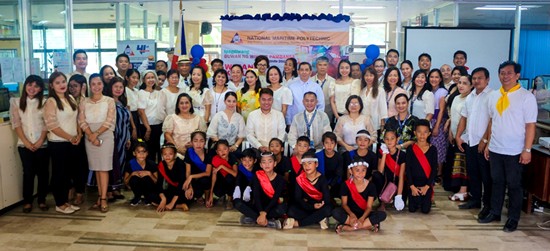
NMP
Officials, guests, employees and Job Order Workers during
the celebration of Buwan ng Wikang Pambansa. |
Sustain native
language, NMP says
By
National Maritime
Polytechnic
August 30, 2019
TACLOBAN CITY – The
National Maritime Polytechnic unites with the Philippine nation in
honoring the Filipino and native languages in celebration of the
2019 Buwan ng Wikang Pambansa.
In order to preserve and
promote the native language, NMP added activities related to this
year’s Buwan ng Wika theme: “Wikang Katutubo: Tungo sa Isang Bansang
Filipino”, during its Flag Raising Ceremony last 27 August 2019 at
the NMP Administration Building.
Executive Director Joel
Maglunsod conveyed his thoughts on the celebration anchoring his
speech on the proclamation of the United Nations General Assembly
declaring 2019 as the International Year of Indigenous Languages.
According to him, the nation was colonized by different countries
but nonetheless, the Filipinos must revitalize and sustain the
native language especially our seafarers as the Philippines' sailing
ambassadors to different countries around the world.
The program was made
meaningful with spoken poetry, indigenous songs and traditional
dance participated by NMP employees and Job Order Workers.
Selected Cabalawan
Elementary School students also presented an interpretative dance
entitled Tagumpay Nating Lahat and a hand-over ceremony of donated
books to the said school from S & A Learning Solutions and Books For
A Cause also took part in the program.
The Buwan ng Wika is
commemorated every month of August in accordance to the Proclamation
No. 1041 signed by then President Fidel Ramos on 1997 which goes
with the celebration of the birth of the Father of National
Language, late President Manuel Quezon.
|
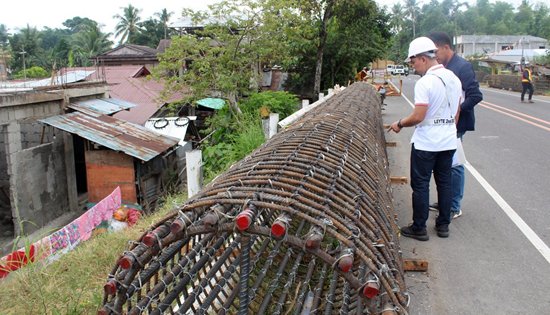
DE
Pacanan ensures that fabrication of reinforcement cages of
bored piles conforms with the plans and program of works
during his visit to the project site. |
DPWH implements
widening of Tunga bridge
By
DPWH 2nd LED
August 30, 2019
TUNGA, Leyte – The
Department of Public Works and Highways (DPWH) Leyte Second District
Engineering Office (L2DEO) has started its construction works for
the widening of Tunga bridge in Poblacion, Tunga along Palo-Carigara-Ormoc
road section.
“The widening of Tunga
bridge measures a width of 4.98 meters each on both sides and length
of 31.6 meters in the amount of P29.1 million,” District Engineer
Gerald Pacanan said.
“Traffic will not be
affected, considering that the project will only expand the bridge
and the existing bridge can still be utilized. Proper signage and
warning signs are installed to ensure safety for the travelling
public,” he added.
The bridge is within the
primary highway that connects Tacloban City to Ormoc City, the
commercial hub in western Leyte and the region’s major gateway to
Cebu City.
The construction started
last July 11, 2019 and is targeted to be finished on or before
January 22, 2020.
For 2019, Carigara bridge
is now undergoing major repair while Barugohay bridge in Carigara
town and Hibuga bridge in Mayorga town will be retrofitted.
Moreover, new permanent
Ibawon bridge in Mac Arthur will be built and Atipolo Daco in
Capoocan will be widened.
P20 million river
wall project to protect residents in Carigara
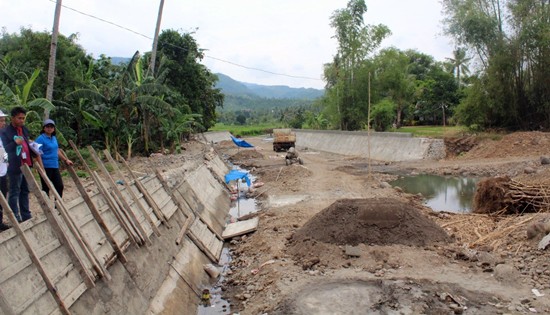
By
DPWH 2nd LED
August 30, 2019
CARIGARA, Leyte –
Twenty million worth of flood control structure underway in the
stretch of river in Barangay Manloy. The Department of Public Works
and Highways (DPWH), Leyte Second District Engineering Office,
Carigara, Leyte now builds retaining wall to fasten water flow and
prevent flooding in the nearby areas.
“One of the mandates of
the DPWH is to build flood control structures to protect lives and
properties from force majeure,” said District Engineer Gerald
Pacanan.
During his inspection,
Pacanan urged the contractor to fast track the project
implementation to avoid delays on the operations when rainy season
comes.
A total length of 438
lineal meter and height of 2.5 meters will be built in Manloy river.
Manloy has a land area of
419.62 hectares of which 20% are irrigated with rice lands, as
farming is the main source of livelihood of the populace.
It traverses the barangay
of San Juan, Caghalo, Barayong in Carigara and Manloy in Capoocan
which are known as the big rice producer in the municipality.
|
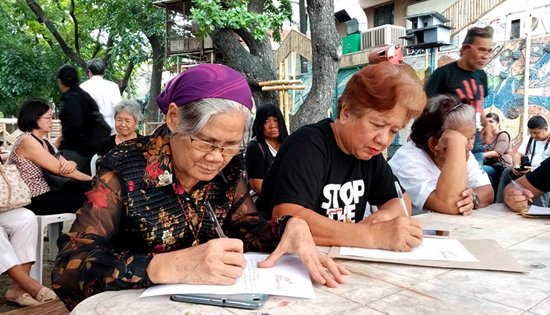
Erlinda
Cadapan and Concepcion Empeno, mothers of missing UP
students Sherlyn Cadapan and Karen Empeno, write their
letters to UN high commissioner Bachelet. |
“Hear us”,
families of the disappeared write to UN High Commissioner for Human
Rights Michelle Bachelet on Int’l Day of the Disappeared
By
DESAPARECIDOS
August 30, 2019
QUEZON CITY –
Members of Desaparecidos, an organization of families of the
disappeared in the Philippines, wrote letters addressed to UN High
Commissioner for Human Rights Michelle Bachelet on the International
Day of the Victims of Enforced Disappearances, August 30, 2019. The
initiative was in line with the recent passage of the Iceland-led
resolution which was adopted by the UN Human Rights Council and
tasked the said UN chief to write a comprehensive report on the
human rights situation in the country.
“Ang paggunita, pag-alala
at ang patuloy nating paglaban ay ang diwang magmamarka ngayong
Pandaigdigang Araw ng mga Nawawala. Marami ang gustong makalimot na
tayo, marami ang gustong baguhin ang katotohanan, ngunit andito tayo
ngayon para magpatotoo sa mga buhay ng ating mga minamahal na
sapilitang iwinala ng estado. Sumusulat kami kay UN High
Commissioner Michelle Bachelet para umapila na tingnan din niya ang
kaso ng mga biktima ng sapilitang pagkawala, at kung papaanong
magpasahanggang ngayon ay mailap pa rin ang hustisya.
“(We mark the
International Day of the Disappeared as we continue to remember and
fight for our loved ones. Many would want us to just forget, many
would want to distort the truths, but we remain steadfast in serving
witness to the horrible truth that our loved ones were taken away
from us by the State. We write to UN High Commissioner Michelle
Bachelet to appeal to her that she looks into the plight of the
disappeared and as to how justice continues to evade us and our
loved ones),” said Erlinda Cadapan, chairperson of Desaparecidos and
mother of desaparecido Sherlyn Cadapan.
Sherlyn, along with Karen
Empeño, was abducted in 2006 by military men under the command of
now retired general Jovito Palparan Jr. Horrendous accounts of
Sherlyn and Karen’s detention surfaced after a witness detailed the
students’ ordeal. Karen and Sherlyn remain missing, but Palparan and
two other military officials were convicted in 2018.
“We are respectfully and
directly addressing UN High Commissioner Michelle Bachelet:
Activists are still forcibly disappeared. This horror has not
stopped, and even if we have isolated victories in court, this does
not equate to our loved ones coming home to us. Please investigate
the cases of enforced disappearances and also listen to the families
of the victims; hear us,” Cadapan stated.
Among the recent cases of
enforced disappearances involve a longtime activist and peasant
organizer in Central Luzon. Joey Torres Sr. was last seen in Quezon
City before he disappeared without a trace on September 22, 2018.
The family recounted that prior to his disappearance, uniformed
policemen visited the victim in his house in July 2018. Torres’
family went around various military camps in the region to look for
Joey Torres, but to no avail. He remains missing as of this writing.
“Our entire family waits
for him. We will continue to shout his name, to call for the
military to surface him. Joey is an activist, a compassionate
individual and a loving father. Only truly heartless men would tear
apart families by killings and enforced disappearances. Miss na miss
ka na namin, Papa (We miss you, Papa),” Ching Torres appealed. As of
June 2019, there are already 10 victims of enforced disappearances
under the Duterte government.
Cadapan also hit efforts
to whitewash Palparan’s crimes and rehabilitate his image. She
likened this to the government’s effort back in February 2019 to
delist the 625 victims of enforced disappearance in the Philippines
between the years 1975 to 2012 at the United Nations Working Group
on Enforced or Involuntary Disappearance (UN WGEID).
“UN High Commissioner
Michelle Bachelet also survived a dictatorship – that of Chile’s
Augusto Pinochet. She was a political prisoner and she has seen the
extent of repression that governments are capable of. We humbly ask
her to stand alongside us in our fight for remembering, for
justice,” added Cadapan.
“Our grieving continues.
Yet we are continuously being assaulted by attempts to free those
who have been convicted for these truly atrocious crimes. I still
think of Sherlyn, and I still remember the details of how she was
tortured. I want to know where my daughter is; we want our loved
ones surfaced. We appeal to UN High Commissioner Bachelet to talk to
us, for the stories of the disappeared will underscore the gravity
of the human rights situation in the country,” Cadapan ended.